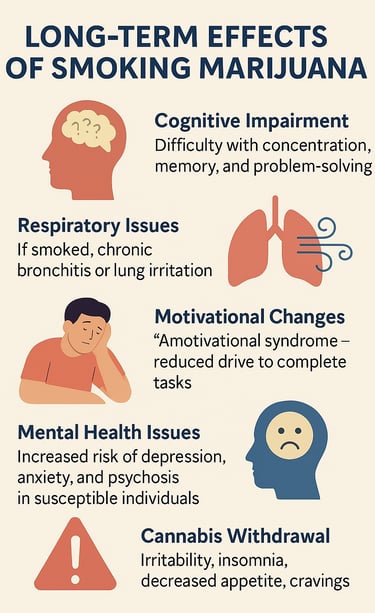Long-Term Marijuana Effects: Risks of Chronic Cannabis Use
Learn about the long-term and chronic use of marijuana, including its effects on mental health, physical health, dependency, and social life. Understand the risks before regular use.
MARIJUANA EFFECTS
Phoenix Hemer
9/27/20251 min read


Long-Term Marijuana Effects: Understanding Chronic Cannabis Use
Marijuana, also known as cannabis, is increasingly popular for recreational and medicinal purposes. While occasional use may have minimal effects, long-term marijuana use can lead to serious physical, mental, and social consequences. Understanding the risks of chronic cannabis use is crucial for informed decision-making.
Cognitive & Mental Health Effects of Chronic Cannabis Use
Research shows that long-term marijuana use can impair cognitive functions such as memory, attention, and learning. Chronic users may struggle with retaining new information and processing complex tasks. Additionally, prolonged cannabis use has been linked to increased risks of anxiety, depression, and psychosis. People with a family history of mental illness may be particularly susceptible to these effects.
Physical Health Risks of Long-Term Marijuana Use
Frequent marijuana smoking can negatively impact lung health. Inhaling cannabis smoke exposes the lungs to chemicals similar to those in tobacco smoke, increasing the risk of chronic bronchitis and respiratory problems. There is also evidence that chronic cannabis use may affect cardiovascular health, including elevated heart rate and potential heart complications in vulnerable individuals.
Dependency, Tolerance, and Cannabis Use Disorder
Regular marijuana use can lead to tolerance, meaning higher doses are needed to achieve the same effects. This can result in dependency and withdrawal symptoms such as irritability, insomnia, and loss of appetite. While marijuana is often considered less addictive than alcohol or nicotine, chronic users are still at risk of developing cannabis use disorder, which can disrupt work, school, and daily life.
Social and Lifestyle Consequences
Long-term cannabis use may affect motivation, academic performance, and career productivity. Persistent use can also strain personal relationships, especially if cannabis consumption interferes with responsibilities or social expectations.
Conclusion
While marijuana can offer therapeutic benefits, long-term and chronic use carries significant risks. Being aware of the cognitive, physical, and social effects of chronic cannabis use is essential. Consulting healthcare professionals can help users make informed decisions and reduce potential harm.
Copyright © 2007- 2025. CannabisCoach.com. All rights reserved. Self‑help content and educational purposes only. Not medical advice. Results may vary. Adults 18+ / 21+ only.